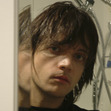Jason V. Brock's Blog, page 132
July 19, 2013
Video of firefighter rescuing kitten goes viral
Have questions about your dog’s health? Ask the vet!
Dog pictured floating to sleep in owner’s arms has died
Fiction Tips Weekly: SimulAcrum: A new collection by Jason V. Brock
In a very rudimentary sense
simulacrum, derived from Latin, means likeness or similarity, a representation
or image. One thinks of the mirror image of one’s self it is true in form
however reversed but lacks the actual substance of the original that casts the
reflection, i.e. the human form standing before the mirror. What is dark
fiction, horror, but visceral writings of the gut that inevitably represent the
deeper truth of what and who we are and what our nature is truly about. These
genres reveal through a vial all that human kind represses, true to form, but
lacking enough to be a story, and dream, or a nightmare.
Jason V Brock (without the
period) is a visceral writer. As we can see from this delightful anthology of
his works, he can rip to the gut and have you attempting
desperately to stuff your entrails back inside before it’s too late.
In the forward written by the
legendary William F. Nolan, the writer remarks “He (Jason) is a deep thinking
individual, even a provocateur, and his work is sometimes extreme, dark and
gruesome…he uses it to expose some flaw or weakness in a character.”
My own experience with Jason
and his writing tells me that there will always be those that exclaim the man
is too controversial. The problem with those views is that it is all too
revealing of the gainsayers that are most likely thick with denial. People,
critical examiners really, that just don’t want to hear the truth. The fact is,
if they don’t want to hear about their own unlovely nature, then they really
need to get out of the horror industry all together because they are doing no
justice there. If there is one thing that Jason’s stories tell us about, it’s
about our lives, our nature, our truth, our self. And through a representation
of that visceral truth, we can see clear to original that lies beyond in the
land of reality.
The collection kicks off with
“What the Dead Eyes Behold.” An image of
that very moment when you look into your significant other’s eyes and are
overwhelmed with the very deepest feelings of love so much that you want to
preserve the moment forever, and ever… and ever!
Next up “The Central Coast,” a
story previously published in Dark Discoveries magazine, starts us off in the
middle trauma and shock. Social gatherings can be horrific enough, without even
coming close to this event. Brock displays the same expertise in setting up the
reader in this story as any Stephen King has written. He enthralls the reader
with terribly vivid scene irresistible to our curious nature only to bring that
shocking and terrible discovery you’d wished you’d never come upon. One thing
is for sure, if you are a wine connoisseur, you might think twice about that
rare estate reserve you’ve had eyes on. It may be more expensive than you
think.
It’s impossible to describe in
a review the depth experienced in reading anything Brock has penned.
Descriptions are as the title suggests only a representation of the actual
experience of reading his work. There are many stories in this collection,
fifteen plus his new novella “Milton’s Children,” but I find it irresistible
not to spoil some delight in each of them. Therefore I’ll leave the rest for
your own experience, an experience that comes highly regarded and suggested.
— Review by Cyrus Wraith Walker
July 18, 2013
Collings Notes: Jason V. Brock’s "Milton’s Children"–Paradise …
Jason
V. Brock. “Milton’s Children.” Bad Moon Books, 2012.
I
don’t know whether Jason Brock wears a hat or not. But if he does, he must have
been kept busy tipping it while writing his singularly effective novella,
“Milton’s Children.”
The
story begins, perhaps a bit oddly, with a question: “Why are you a vegetarian,
Carter?” This relatively non-horrific question introduces both a primary
character, Adam Carter (the name is highly suggestive, given the novella’s
title and the headnote from John Milton’s Paradise
Lost), and a key issue…although for several pages the ensuing dialogue
between Carter and his equally suggestively named antagonist, Chris Faust (c.f. Christopher Marlowe, Dr. Faustus, another Renaissance
disquisition on pride, sin, forgiveness, and hell) seems more a one-sided rant
than the introduction to a short story.
The
two characters cover a number of issues, although Faust is more often than not limited
to a few words or sputtered phrases while Carter is given full play for his
arguments, which include the possibility of animal communication before
broadening to incorporate pollution, global warming, overuse of antibiotics and
chemicals, and a range of additional appalling side-effects of human arrogance.
Finally, Carter asks his own question, “I mean, where does ‘evil’ begin to
enter into the picture, Faust?”
After
a brief hiatus for some necessary backstory, the tale reaches a transition
point and moderates into what is essentially a finely crafted throwback to the
Golden Age of Creature Features. One of the crew has discovered a mysterious, unknown
island, revealed only when global warming causes the Antarctic floes to recede.
Perhaps never trodden on by humans, the island offers a temptation none can
resist. They must explore it.
The first
impression the landing crew receives is of an Antarctic Garden of Eden…but as
with all great Creature Features, first impressions prove woefully,
disastrously, horrifically and bloodily wrong.
And thus
the deaths begin.
In
addition to those already mentioned, Brock incorporates layer upon layer of
allusion to strengthen his modest tale. Several are referred to by name: Jonathan
Swift and A Modest Proposal; Mary Shelley
and Frankenstein (with its insistence
on Paradise Lost as a proof text for
the creature’s moral inquiries); H.P. Lovecraft and At the Mountains of Madness; Skull Island and the various film
versions of King Kong. Others seem
more incidental, although still powerful: E.R. Burroughs’ Pellucidar series
(one of Brock’s characters is Darrell Mahar). The captain of the rescue ship in
the final chapters is Commander Merritt (c.f. A. Merritt?) and the Communications
Officer is surnamed ‘Adams,’ underscoring at least two major themes in “Milton’s
Children.”
(And
one intriguing echo—which I can’t lay this on Brock, of course, since I don’t
know what films he has watched—by the end of his story there are a number of key
resemblances in “Milton’s Children” to one of my favorite ’50s pieces, Roger
Corman’s The Attack of the Crab Monsters.)
Tying
all of these disparate threads together is the introductory note, Satan’s
speech as he surveys the newly created Earth (Paradise Lost, Book IX, ll. 135-139) and brags of the destruction
is he about to wreak on it and on unsuspecting humanity. Although it is clear from
the poem as a whole that Satan is here being self-delusive and that the Father
has in fact planned all that occurs, his words remain powerful. Like others
alluded to in “Milton’s Children”—Milton’s Adam, Marlowe’s Faust, Frankenstein,
Lovecraft’s multifold meddlers in Cosmic affairs, generations of fictional explorers invading unknown
landscapes where they have no right to be—Satan is about to assert dominion over
that which is not his…and pay the ultimate consequences.
In
total, “Milton’s Children” is fascinating. It blends elements that seem on the
surface antithetical. It encourages reminiscence even as it suggests
far-reaching, futuristic possibilities. It combines an elegant command of
language with a relatively fundamental but thoroughly enjoyable plot. It
incorporates clichéd characters and situations in ways that bring them new
life. It manages to tip its hat to perhaps a score of equally intriguing sources while maintaining its own integrity as a narrative. And all within the confines of fewer than seventy pages.
Recommended.
Chatty owls and 17 more amazing animal photos
Pictures from the World Horror Convention in New Orleans
Hello. I am not as cranky as this picture suggests. Stick with me and I promise to smile.

This is my Bitchy Resting Face
A week ago I was in New Orleans for the
-- which for brevity's sake I'll refer to as WHC.
I stayed at the convention venue: the Hotel Monteleone in the French Quarter. My friend and fellow writer, Eliza Hirsch, shared a room.
I arrived Wednesday night with no trouble--unlike Eliza, whose flight was canceled, but that's her story to tell. I rode the Airport Shuttle into the French Quarter, checked in to the hotel, dropped off my stuff, and went in search of a grocery store. I was going on an all day tour the following morning and I'd been told there wouldn't be time to stop for food, so I stocked up on bread, blueberry preserves, peanut butter, and a lot of fruit. There was a minor incident when my bag fell off the counter while I was paying and the jar of preserves shattered inside the bag, but the kind staff replaced the jar and I only had to spend a little time washing blueberry paste off my bananas.
The weather was clear during my excursion, humid, and hot. I assembled my lunch for the next day, had a cocktail in the hotel bar (it spins slowly, hence the name Carousel) and went to bed.

A dim view of the Carousel Bar at Hotel Monteleone

A Vieux Carre at the Hotel Monteleone
Thursday morning I ate breakfast in the hotel restaurant, Criollo--a delicious egg white omelet filled with vegetables and a spicy tomato sauce, plus lots of coffee. Then I caught the tour bus and we headed out to the Laura Plantation.

Front of Laura -- a Creole Plantation, comprehensive info here
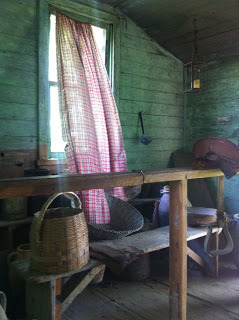
Inside of one of the Laura Plantation slave quarters where folklorists recorded the Br'er Rabbit tales
Soon enough we were on our way to the swamp. I had arranged for a six-person airboat tour of the swamp, but lucked out. Only four of us were on the boat.

Waiting for my turn on the airboat. Not pictured: slathering on sunscreen.

My view on the airboat

"Airboat Self-Portrait" is the name of my next band

Our guide feeds marshmallows to a gator

Spanish Moss is not a moss. It is related to the pineapple.

A final stop in the marsh, talking about collecting gator eggs
Overall I really enjoyed the airboat swamp tour. I compared notes with some folks who took the regular flat-bottomed boat and they interacted with more wildlife, but the ride through the swamp was exhilarating.
Time passes. I meet up with my roommate and go on a ghost tour. Buy one Hurricane, get one free...

We were in the Beast group
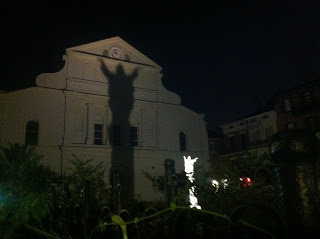
"Creepy Jesus Shadow"
After the tour was over, Eliza and I took a brief walk down Bourbon Street. Thankfully, no pictures exist of that excursion.
The next morning (Friday) I went to a useful workshop about marketing taught by Matt Schwartz. And then I went to panels and readings.

Author Benjamin Kane Ethridge
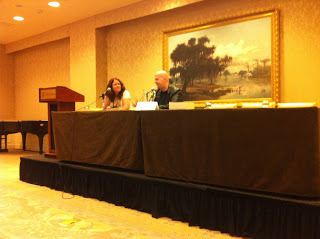
Lisa Morton interviews John Joseph Adams

Selling Your Short Story Panel: Simon McCaffery, Ellen Datlow, Norman Prentiss, John Joseph Adams

Caitlín R. Kiernan is interviewed by Angel Leigh McCoy
Dinner was at a Paris-style place. I enjoyed the Shrimp Creole and a Bloody Mary. Then I returned for more.
Eliza and I dressed up for the dance.

Eliza looking lovely

Me goofing around
Next day more panels and readings. And a Kaffeeklatsch with Caitlín R. Kiernan.

Robert McCammon, reading

Kaffeeklatsch: Caitlín R. Kiernan (Best two and a half hours of the con)
For lunch I joined a group at Mr. B's for seafood gumbo and a Bloody Mary.

Caitlín R. Kiernan, reading
Eliza and I took a break to go to the Voodoo Museum with a stop at the Faulkner House and another for daiquiris.

Voodoo Museum
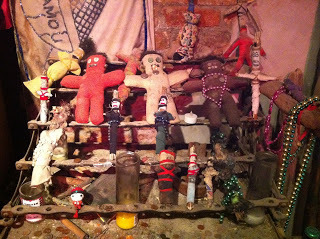
Voodoo dolls
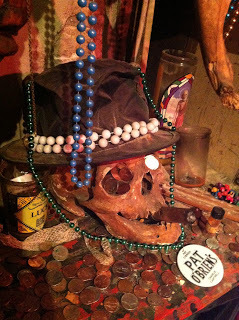
Offerings at the Voodoo Museum
That evening I went to the Bram Stoker Awards, but I was too busy telling jokes and stuffing my face to take crummy camera phone pics.

Eliza and I went to see fellow writer Sanford Allen play a gig with his band Hogbitch at Checkpoint Charlie's
Sunday morning arrived fast. As an aside, I ate almost every breakfast at Café Beignet. Fabulous Cajun Hashbrowns and omelets.
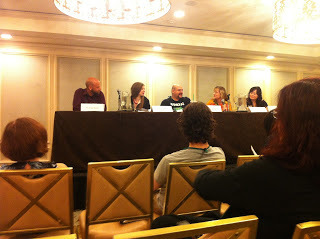
Advice for New Writers Panel: K. Trap Jones, Liz Gorinsky, L. L. Soares, Yvonne Navarro, Rena Mason
I also went to the dialogue panel but didn't take a photo. Too busy scribbling notes.
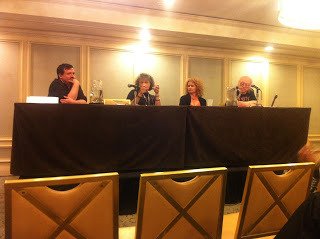
The Future of Writing Panel: Peter Giglio, Jason V Brock, Alexandra Sokoloff, William F. Nolan
After the closing ceremonies I joined up with some cool people, ate lunch, walked around and imbibed a lot--including a stop at Pat O'Brien's for a Hurricane. Also, absinthe.

At The Olde Absinthe House, the bartender prepares our drinks

My glass of Mata Hari absinthe. Very tasty. The anise was subtle.
Sunday night also involved a snack at Daisy Duke's and a lot of packing. Monday morning I caught a shuttle to the airport and had an uneventful trip home.
Can't wait for next year in Portland, OR!
Then and now: Kids growing up with their four-legged friends
Collings Notes: Jason V Brock, SIMULACRUM AND OTHER …
Simulacrum and Other
Possible Realities
Jason V. Brock.
Hippocampus
ISBN13: 97801061498-055-1
2013,
$20.00, Trade paper
It sometimes seems that
stories—often much like their authors—have shapes and textures. Some feel warm
and fuzzy; others are free-form, open, unrestrained; still others are
distanced, controlled and controlling.
After reading the stories and
poems that comprise Jason V Brock’s
and Other Possible Realities,
I realized that no one else could have
written these pieces, brought the same sharpness of focus, the same intensity,
the same crispness of intellect to bear on such a variety of subjects. I’ve
only met Jason once, at the 2012 Horror Writers Association Conference, when he
served as a mediator-of-sorts between Rocky Wood and me on a Stephen King
panel. Rocky was having serious problems speaking, so as others on the panel
contributed their ideas, he wrote his responses on his computer; when the time
came, Jason read them aloud and commented on them. At the same time, he
re-stated panelists’ comments and audience questions for me, since I could frequently
neither hear nor understand them. I was impressed with his skill in handling
several tasks simultaneously, in remaining true to the individuals’ intentions
and at the same time bringing a unique perspective to them. I left the panel
grateful to have had his help and to have met him.
The stories and poems in Simulacrum fit perfectly with my view of
the author. They try to mediate, to transliterate as it were, from one mode of
thinking to another. The headnote story, “What the Dead’s Eyes Behold” is
rather like a 21st-century version of Robert Browning’s remarkable
study of abnormal psychology, “Porphyria’s Lover.” In it, the narrator speaks
of looking into his beloved’s eyes and, seeing there an instant of perfect,
undiluted love for him, “found/A thing to do”—he wraps her hair three times
around her throat and strangles her, thus encapsulating forever that single
moment. “And yet,” he notes almost as an afterthought, “God has not said a
word.”
In Brock’s story, the backgrounds
are diametrically opposed to Browning’s. There is no quest for an eternal
moment caught in an instant, for perfect love; instead, the character and his
victim/sacrifice, Calliope, exist in a world without love, without eternals.
And instead of searching for a phantom togetherness in a fraction of time, they
deny that any such togetherness can exist. All that exists is death. And, for
the narrator, the moment when living eyes look upon death. Hers…and his.
Browning’s lover found solace and
comfort; Brock’s cannot.
Near the end of the collection,
Brock has included his stand-alone novella, “Milton’s Children.” In some ways
it is the opposite of “What the Dead’s Eyes Behold.” It is external and
objective, the report of an expedition to a cluster of previously unknown
islands near the Antarctic. Yet, inexorably, what seems like an everyday
mission rapidly shifts to a phantasmagoria of horror ultimately equally
inexplicable and inconclusive. (For a longer review of the story, see
or
).
In between, Brock has incorporated
a wide range of stories that challenge the notions of normalcy, rationality,
and acceptability. “The Central Coast” has at its core a haunted bottle of wine
and the unforeseen consequences of a single drink. In “One for the Road,” there
is clearly a serial killer and a victim; the quandary is determining which is
which…and who is who—a leitmotif that
recurs in story after story. “The Hex Factor” takes as a given a world in which
hexes and magic not only work but are proprietor; what would the results be if
someone stole another’s Grimoire? “Valor: A Fable” is, again, a story about
choice and consequence, told in a just-so-slightly archaic diction that
perfectly weds tale to meaning.
And more….
Throughout, Brock deals with
questions of death and mortality (with a few glances at immortality), of
consequence, of choice, of the nature of identity itself. He does not hesitate
to incorporate politics, morality, and social causes into the fabric of the
stories, but in each instance, what might be merely an authorial intrusion
becomes welded to the story itself; to think about vegetarianism in “Milton’s
Children,” for example—as the opening pages insist that readers do—is to
prepare for the climax, for the realities that the characters discover on the
island.
Intercut with the stories are
poems that are as compressed and as trenchant as the tales themselves.
Typically, Brock explores multiple approaches: line-length free verse;
occasional spates of rhyme; typography and the visual effects of composition;
even variations in fonts to suggest shifts in meaning.
Taken as a whole,
is
-Jason V. Brock. Each story,
each poem carries his unique imprint. Some might take longer than others to resolve,
but I the act of considering each lies a significant portion of their power.
Recommended.
Guest Appearance–Stephanie M. Wytovich

Good Wednesday,
The Lockbox is happy to have a guest today. You may remember Stephanie Wytovich. I interviewed her last summer. Well, she’s back, and she’s going to talk about her forthcoming book of horror poetry, HYSTERIA.
Without further ado, here she is.
-So…talk to us about HYSTERIA. What’s it about?
The easy answer is that HYSTERIA is about madness, but to me, it’s always been about acceptance. When I sat down and decided to start writing it, I essentially decided to go a little mad myself. There was nothing easy about writing this collection: no fun nights composing next to the moon, no clever evenings spent making up metaphors and bringing characters to life.
It was hard.
And it was painful.
I read a lot of abnormal psychology, studied the diseases of the brain, and traveled across the states to visit different asylums and feel the air and the charge of what it meant to be locked up in solitary. I sat in the isolation rooms of West Virginia’s State Penitentiary, and spent the night at the Trans-Allegheny Lunatic Asylum.
And then I met her.
Hysteria.
Most of the pieces came to me late at night, crazed and racked by insomnia, and when they did, they were fluent and clear, as if I were talking to the characters one-on-one. I wrote down their voices, shaped the faces that I saw in my nightmares, and looking back, it’s no wonder I didn’t sleep. The patients that readers will meet in this collection are vicious, cruel, and more often than not, completely insane.
Although there are a few innocents.
But who out there is really walking around with a clean conscience?
-What inspired you to put the book together?
When I was an undergraduate at Seton Hill University, I had to start a blog for my Intro. To Literary Study course. I heard everyone talking about blogs and their importance, but to me, it just seemed like another chore that I had to maintain when all I wanted to do was write poetry and study art. But, I created one…quite sarcastically at that.
“Join me in the madhouse,” I said.
Blogging drove me insane, and I hated doing it. And then one day, I hated it a little less, and then even lesser than that. The crazy part about it was that I soon started doing it for fun. I played with the madhouse theme, reviewing psychological films and critiquing books under the veil of psychoanalytic criticism. I read a lot of Freud—probably too much Freud—and paid special attention to his ideas on sexuality and the uncanny.
I saw madness—erotic, uncanny madness—everywhere I went.
The thick, black sludge of the mind’s breaking point.
And when I realized that madness broods inside us all—whether we choose to accept it or not—I knew that I had to explore it, dissect it, rip it apart with a scalpel and study it.
And so I did.
-Is there anything in there that shocked even you?
The entire collection was/is quite shocking to me. Yes, I realize that probably sounds odd considering I write horror, but I don’t think I’ve ever created something so dark, so angry before. There are pieces in there that I look at and think who/what wrote that?
But that’s what I wanted.
I wanted the voice that not only sits in the shadows, but is the shadows. I wanted darkness, blackness, and madness all wrapped up in a straightjacket and ready to go.
And then I wanted to release it and watch the asylum burn.
-Do you ever see yourself writing anything but horror?
Horror is what I do—what I love to do—and I can’t imagine doing anything else, because let’s face it… horror is in everything. What’s scarier than exploring space and meeting aliens? What’s more frightening than meeting creatures that exist only in your wildest dreams? And what’s more horrifying than falling in love?
Fear is in everything.
It doesn’t matter what genre I’m writing in.
I’m going to strangle it and take it down.
-Name a book/tv show/movie you like that would surprise people.
Something that would surprise people, eh?
I’ve seen every episode of Spongebob to date.
And I was there opening day to see the movie when it came out.
That crazy, yellow sponge cracks me up.
Preorder your copy of HYSTERIA here.
Find Stephanie on the web at her blog. Follow her on Twitter @JustAfterSunset.
She’s also on Goodreads. Enter the giveaway to win a free copy of HYSTERIA!
“Also, I’ll be reading from Hysteria at Kafe Kerouac on August 2 from 7-9 p.m. alongside fellow poets John Edward Lawson and Michael A. Arnzen to kick off DogCon2. There will be comedy, madness, and amputated prose, not to mention a whiskey tasting to follow! We’d love to see you there!”
About Stephanie
Stephanie M. Wytovich is an Alum of Seton Hill University where she was a double major in English Literature and Art History. Wytovich is published in over 40 literary magazines and HYSTERIA is her first collection. She is currently attending graduate school to pursue her MFA in Writing Popular Fiction, and is working on a novel. She is the Poetry Editor for Raw Dog Screaming Press and a book reviewer for S.T. Joshi, Jason V. Brock and William F. Nolan’s Nameless Magazine. She plans to continue in academia to get her doctorate in Gothic Literature.
Check out my previous interview of Stephanie here.

